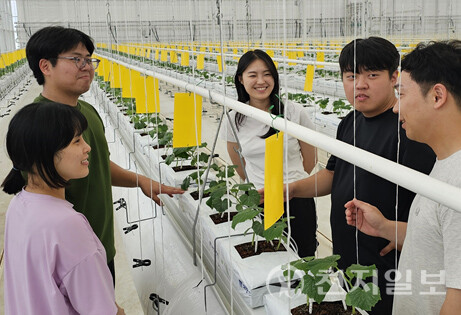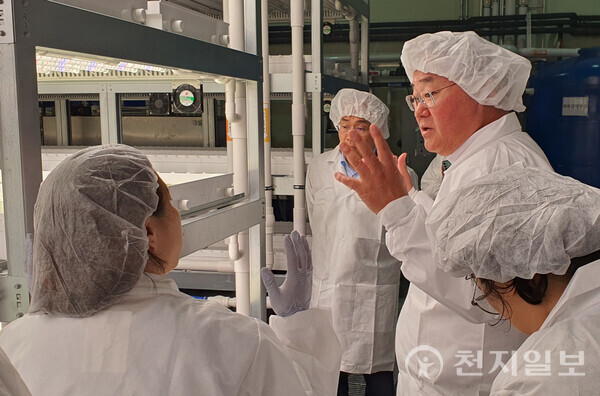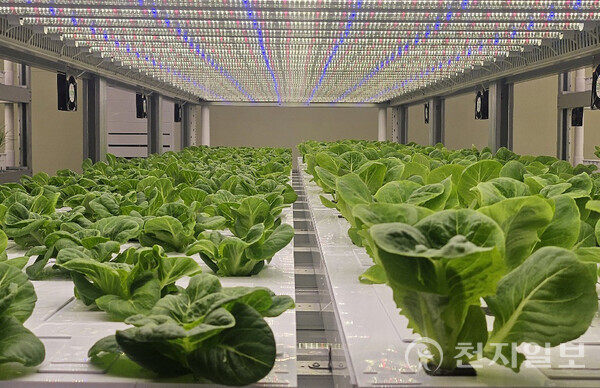From training to leasing and start-up support
Step-by-step education system focused on field training
Increased settlement through leasing and startup packages
Field trials expand to orchards, open fields, and vertical farms
High personal cost burdens… Diversifying crops and farming methods
Plan to build public-private integrated testbed and research complex

[Cheonji Ilbo Jeonbuk=Reporter Kim Dong-hyun] Jeonbuk Province is transforming smart agriculture from mere technological dissemination into a structural transition experiment. It has uniquely established a phased settlement model that connects youth education, field training, leasing, and start-ups—producing tangible results in new agricultural businesses and local settlement.
Centered around the Gimje Smart Farm Innovation Valley and Jangsu rental farms, this model lowers entry barriers for young farmers and provides a stable foundation for settlement. However, obstacles such as initial capital burdens and limited leasing opportunities still remain.
The province is also pioneering the nation’s first public vertical farm and expanding smart farming technologies into orchards and open-field vegetables. Plans are also underway to establish a test platform in Saemangeum.
◆Gateway to Smart Agriculture… Step-by-Step Settlement Support
Gimje Smart Farm Innovation Valley is one of four national hubs and serves as a key foundation for smart farming entry. It includes a youth start-up incubation center, rental smart farms, a demonstration complex, and a big data center.
The incubation center offers 20 months of foundational education and business-oriented field practice, enabling participants to acquire crop production and environmental control skills. Since 2018, 280 people have participated, and 248 have completed the program. For the 8th cohort this year, 268 applied nationwide, marking a competition rate of 5.2 to 1. Graduates are eligible to apply for rental smart farm programs and start-up packages.
The province operates eight rental-type smart farms—four funded nationally and four by local initiatives. An additional 8-hectare rental farm is being developed in Jangsu County.
The youth start-up smart farm package supports 64 smart farms, each about 1,984㎡ (600 pyeong), at a scale of 440 million KRW with 30% self-financing. Of the 64 beneficiaries, 28 were from outside the province, and 26 of them settled in Jeonbuk with their families.
Yoo Yong-yeol, head of Jeonbuk’s Smart Agriculture Team, said, “There was considerable resistance to traditional farming, but smart farm facilities offer clean environments and automation, making it easier for young people to enter the field. Our tight-knit support from training to start-up is leading to high settlement rates.”

◆Practical Education Helps, but Reality Remains Harsh
Systematic education in smart agriculture is facilitating youth entry, but start-up realities are tough. Moon Yu-ran, a smart farm operator in Jeongeup, completed training at the Gimje Smart Farm Innovation Valley and now runs a 4,959㎡ (1,500 pyeong) strawberry smart farm through the support package.
Moon cited the ability to produce high-quality crops in a controlled environment as a major advantage of smart farming. However, she pointed out that the biggest challenge was raising capital.
“It cost about 1.3 billion KRW (approx. $1M) for land, greenhouses, and internal facilities,” she recalled. “The initial investment was far more than expected, and securing funds was the hardest part.” She added that the package requires over 100 million KRW of self-financing, separate land acquisition, and difficult loan processes—posing a high barrier to actual entrepreneurship.
Moon also noted that many program graduates face hurdles. “Out of 50 graduates, only 10–20 can access rental farms. When there are no open slots, that number drops to fewer than 10,” she said. She emphasized that the current 3-year lease term is too short to build a self-sustaining foundation and called for expanded leasing opportunities and longer lease terms.

◆Expanding Demonstrations: From Vertical Farms to Orchards and Fields
The province is broadening smart farming demonstrations into vertical farms, orchards, and open fields. In Jangsu County, the nation’s first public vertical farm is in pilot operation, with six young farmers cultivating leafy vegetables.
Yoo explained, “We began demonstrating vertical farming due to the need for equipment standardization and climate adaptation. We're currently validating profitability and considering remodeling unused public facilities.”
In the orchard sector, Jangsu County has been selected for a smart orchard specialization project and is switching to heat-resistant varieties.
Yoo added, “Due to climate change, fruit coloration is delayed, and harvesting is affected. The key is updating varieties and adopting multi-axis horizontal tree structures to allow machinery access.”
Open-field vegetable trials are also underway. In summer cabbage fields, micro-sprinklers are being used to lower temperatures and improve head formation.
“It’s difficult for technology to keep pace with rapidly changing climate conditions,” Yoo said, “but we’re responding in both orchards and open fields using smart agricultural technologies.”

◆Saemangeum as a Smart Farming Hub
The province is planning to make Saemangeum a core hub for smart agriculture demonstration. Given its soil characteristics, open-field farming is difficult, making smart greenhouses a necessity.
“Saemangeum is an ideal testbed,” said Yoo. “It combines agricultural universities like Jeonbuk National University and Wonkwang University, institutions like the Rural Development Administration and KIST, and vast land. Jeonbuk can take the lead in building a demonstration ecosystem integrating private, academic, and research sectors.”
The province also recognizes rising energy costs and crop diversification as urgent challenges. “Summer now extends from May to November, leading to high cooling costs,” said Yoo, adding that they are seeking alternatives in collaboration with companies. “The top priority is developing resilient crops and growing methods suited for climate change,” he emphasized.
Jeonbuk’s smart agriculture is more than technological implementation—it is a strategic experiment for transitioning the entire agricultural ecosystem. With its phased support system and demonstration models spanning vertical farms, orchards, and open fields, the province is confronting the limitations of conventional farming head-on. Amid climate crises, demographic shifts, and the search for new regional economic drivers, Jeonbuk is emerging as a key reference point for the future of agriculture.
- [전국인사이드ㅣ전북-스마트팜] 농업의 좌표를 다시 묻다… 전북이 만든 ‘정착의 구조’
- [1-Minute Cut] Top-tier Infrastructure, Poor Connectivity: Opportunities and Challenges in Jeonbuk’s Carbon Industry
- [1분컷] 인프라는 최고, 연결은 최저… 전북 탄소산업의 기회와 위기
- [National InsideㅣJeonbuk–Carbon] Top-Class Infrastructure, Weakest Links… Jeonbuk's Carbon Industry at a Crossroads
- [전국인사이드ㅣ전북–탄소] 인프라는 최고, 연결은 최저… 전북 탄소산업의 기회와 위기
- [1-Minute Cut] “Co-Growth” vs “Political Ambition”… Jeonju-Wanju Merger Conflict
- [1분컷] “함께 성장” vs “정치 야욕”… 전주·완주 통합 갈등
- [Nationwide InsideㅣJeonbuk] “Co-growth” vs “Political Ambition”… Jeonju-Wanju Merger Conflict
- [전국인사이드ㅣ전북] “함께 성장” vs “정치 야욕”… 전주·완주 통합 갈등
- [One-Minute Cut] Jeonbuk aimed for “first-class integrity” but remains at third-class for 3 years, innovation urgently needed
- [1분컷] 전북 ‘청렴도 1등급’ 목표했지만… 3년째 3등급, 혁신 시급
- [National Inside | Jeonbuk – Public Officials Status] Jeonbuk Aims for “Top Integrity Level”… Still at Level 3 for 3 Years, Urgent Need for Reform
- [전국인사이드 | 전북-공무원 실태] 전북 ‘청렴도 1등급’ 목표했지만… 3년째 3등급, 혁신 시급
- [1분컷] “성과는 말뿐”… 김관영호, 공약과 정책 모두 흔들린 3년
- [Nationwide Inside┃Jeonbuk] “Achievements in Words Only”… Three Years of Kim Kwan-young’s Administration Marred by Faltering Promises and Policies
- [전국인사이드┃전북] “성과는 말뿐”… 김관영호, 공약과 정책 모두 흔들린 3년
- [1분컷] 농업의 좌표를 다시 묻다… 전북이 만든 ‘정착의 구조’
- [1-Min Brief] Rethinking the Coordinates of Agriculture… Jeonbuk Builds a ‘Structure for Settlement’

